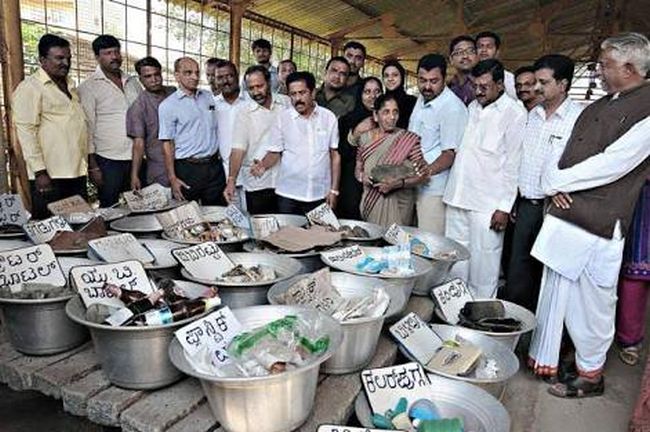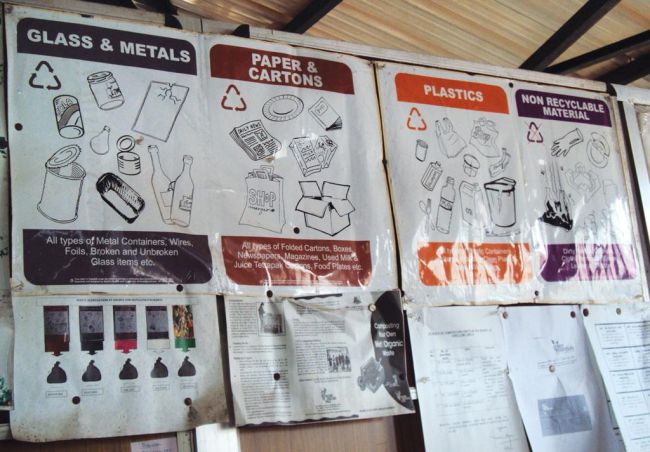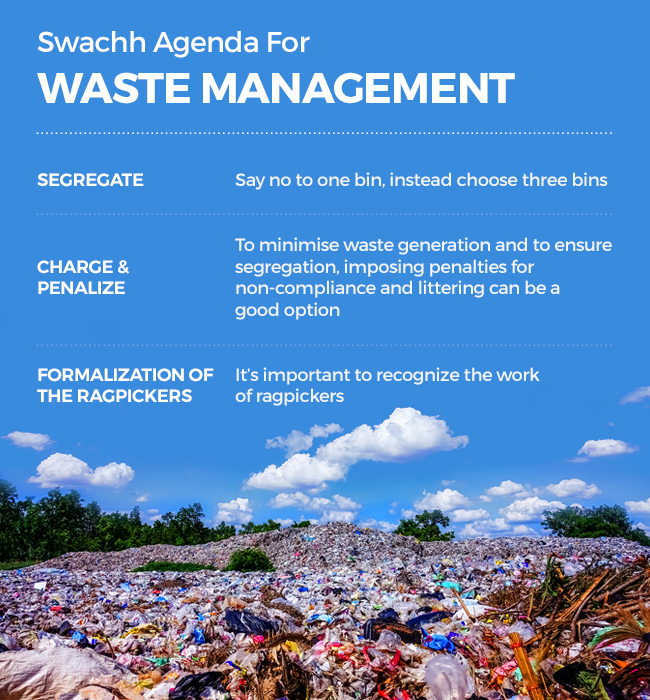Waste management is a huge challenge and crisis for our country but some cities have managed to put in successful waste management systems and made a significant leap forward and could become models for the country. Not in my backyard, a book by Delhi-based NGO Centre for Science and Environment attempts to highlight the present status of solid waste management in our country, and also, how we need to urgently reinvent our methods and ways to achieving it.
Land being at a premium across India, most landfills in the country are also way past the saturation period. Improper waste management causes air pollution from burning of waste both at landfill sites and in open areas, and pollution of groundwater as well. What’s important is to sort out a concrete waste management system that ensures segregation and recycling.
It’s important to turn the waste story around so we have to stop looking at waste as waste. We have to start looking as waste as resource. To look it as a resource means that you have to be able to segregate and you have to be able to process it – Sunita Narain, the director of Centre for Science and Environment
We travelled to the cities mentioned in the book to check how they are managing their waste differently and efficiently.
Stop One: Allepey, Kerala
Allepey, also known as the “Venetian Capital” of Kerala, full of beautiful canals and back waters attracting thousands of tourists each year.
In 2012, the Sarvodayapuram dump yard where the municipality of Allepey had been dumping the city’s waste for decades was closed down due to protests. As garbage started spreading everywhere in the city, Allepey was forced to try different methods of waste management.
MR Prem, the Municipal Commisioner of Alleppey told us how a people’s campaign for processing waste at the source was born. “The pilot project for 12 wards was successful and today it has transformed the city’s waste scenario. The focus of the initiative was segregation and treatment of wet waste at the source” said Prem.
The Allepey municipality has helped install biogas plants, both portable and fixed, in about 40,000 households across 52 wards. The pipe composting system, Thumburmuzhi, aerobic composting units are other unique ways to process waste into compost.
Today the municipality with a population of nearly 2.5 lakhs, besides the visiting tourists and floating population, is still generating vast amounts of solid waste but no longer has truckloads of garbage headed daily to a nearby dumping yard. That has led to a saving of nearly Rs. 11 lakhs on transportation alone and a huge reduction in LPG bills.
It’s inspiring to see how the city has revolutionized municipal solid waste management. The municipalities have withdrawn from the waste business and people segregate and compost their waste themselves. Informal recyclers then collect and sell recycled waste. Currently, efforts are being made to scale up the Allepey model to the rest of Kerala and then eventually to the rest of the country.
Stop 2: Mysuru, Karnataka
The city of palaces is a huge tourist attraction and still retains an old world charm and green cover. It has been declared the cleanest city in the country based on two Swachh Bharat parameters – open defecation and solid waste management. So where does Mysuru score over other cities?
According to Dr. Nagesh from the Mysuru Corporation, “Residents have been trained to segregate “wet” organic waste from dry waste and to use different colored bins for each. The door-to-door collection starts in the morning at 6.30 and is carried out by community workers known as pourakarmikas. Wet waste is collected daily and sent to compost, whereas dry waste that is collected weekly is sent to recyclers, so it is zero waste management being strictly implemented by the corporation.”
“The garbage is neatly segregated into over 24 categories, labelled, and sold to scrap merchants who sell it to recyclers and industries that can reuse the material. Nothing goes to waste, not even bottle caps and the biodegradable waste is subjected to composting and converted to manure within 30-45 days,” says Mytra, Environmental Engineer, Mysuru Corporation
Mysuru’s waste management is a decentralized model that works thanks to cooperation between all the key players, from the municipality, to residents and businesses. Not only are Mysuru’s streets free of litter but nearly all of the waste gets recycled.
Stop 3: Panjim, Goa
The picturesque city of Panjim, the capital of Goa, has changed the way it managed its waste after 2003. Till the early 1990s, the town’s solid waste management essentially dumping waste on a hillside outside the main city. Not quite the picture one has in mind when thinking of one of India’s favourite tourist destinations.
However, it took one day of heavy rain and a devastating landslide for the people of Panjim to realise they needed to change. Sanjit Rodrigues, Former Municipal Commisioner, Panjim recalls, “Panjim was like any city collecting roadside waste and dumping it on a hillside but Goa is a state that receives huge rainfall. One year we had a landslide at the dump site, and it was like a landslide of garbage was flowing from the hill to villages and fields. Houses were buried with garbage. There was a revolt, there was anger and agitation. Panjim lost the dumping site so we decided Panjim will not dump anymore and for 10 years we have stuck to this decision to treat our waste, segregate and co-process our waste.”
Today, the city today is bin-free, with an excellent colour-coded five category waste segregation system. Waste management is carried out at three levels: collection and segregation, transportation and intermediate storage, and treatment and processing.
Wet waste is composted in decentralised compost pits in the colonies. There are about 70 composting units in the city whereas dry waste is brought to sorting centres to be sorted with the help of a moving belt.
Waste is managed systematically and under a strict set of rules, with defaulters getting penalized. This has ensured that the Corporation of the City of Panaji (CCP) is an excellent model of waste management.
3 cities across 3 states in India – what is common is that they have learnt to properly segregate their wet from dry waste and have employed both large and decentralised models to get rid of their garbage. These are models that the rest of the country can easily learn from.























































